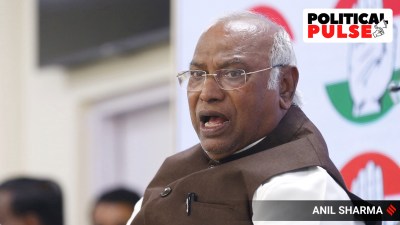- India
- International
Central farm bills give states opportunity to liberate farmer from archaic systems
This is certainly the 1991 moment for Indian agriculture. The first state off the starting block will liberate the Indian farmer as no other action of government has done in the last five decades.
 Protesting farmers block NH-1 near Ladowal toll plaza in Ludhiana during a "Chakka jam" against farm bills. (Express Photo by Gurmeet Singh/File)
Protesting farmers block NH-1 near Ladowal toll plaza in Ludhiana during a "Chakka jam" against farm bills. (Express Photo by Gurmeet Singh/File)The Centre has finally decided to bite the bullet by instituting major reforms in the labour and agriculture sectors. The reforms were announced piggy-backing on the COVID-19 relief package. Parliament has passed three bills on agriculture reform. This has evoked protests, largely in Punjab and Haryana. Unfortunately, politics in India has been played in the name of the farmer. Parties across the political spectrum have, at some point of time or other, advocated the reversal of the archaic mandi system. However, some parties continue to decry the steps taken.
Taking recourse to Article 254 of the Constitution, the Punjab government has passed its own bills to nullify some provisions of the central acts. Similar action by the Chhattisgarh and Rajasthan governments seems to be on the anvil. Let us analyse the legal implications of this action and how it might impact farmers in these states.
The Constitution has placed agriculture on the state list, implying that state governments are required to address all issues relating to it. However, it is the Centre which decides and announces support prices for major crops for the entire country. It also decides issues such as bank loan waivers. International agreements and multilateral trade in agricultural products also fall in the Union government’s domain — issues related to agricultural and dairy products, in fact, had a prominent role in India not joining the Regional Comprehensive Economic Partnership (RCEP). So, in effect, agriculture gets dual consideration. This has led to considerable debate for moving it to the concurrent list. There is precedence for such action — the 42nd constitutional amendment had moved education to the concurrent list in 1976.
Some other constitutional provisions, in the Union and concurrent lists, provide legal justification for the Centre’s intervention in issues pertaining to agriculture. Entry 33 in the concurrent list limits the power of states in agriculture, by empowering both governments to legislate on production, trade and supply of a range of agricultural foodstuffs and raw material. In fact, the Sarkaria Commission had opined on the Union government using Entry 33 to promulgate the EC Act in 1955. This significantly enhanced the Centre’s power.

What seems to have raised the hackles of the states are provisions in the new bills which entrust the Centre with overriding powers of implementation. The Congress has issued an advisory to governments in states in which it holds office to explore the possibility of passing laws under Article 254(2) to bypass the central legislation. In doing so, they are taking a leaf out of the NDA government’s book — in 2015, the NDA government had been unable to amend the Land Acquisition Act passed by UPA-II due to an inadequate majority in the Rajya Sabha. It had then advised BJP-led states to invoke Article 254(2) to override the provisions of the central act.
The Punjab bill has set in motion the process of states taking refuge under Article 254 to pass their own pieces of legislation. The bill declares all purchases below the MSP to be illegal and punishable with imprisonment. It has also levied a fee on trade outside the mandis. All state bills that seek to nullify central acts have to be approved by the President after they have received the consent of the governor of the state. It is quite likely that the Punjab governor will return the bills, but will be legally constrained to pass them on to the President once the state government sends it to him again. If the intent of the Centre in passing the new acts were to prevail, it would advise the President to reject the Punjab legislation. It could even languish with the President for a long time. However, if they play politics, they could go along and advise presidential assent while continuing to undertake procurement at MSP — which the Centre had declared that it would not be curtailing. This may take the wind out of the sails of the state government as they have declared mandatory the purchase of only paddy and wheat at MSP. These two foodgrains were, in any case, being more or less fully mopped up by procurement agencies. Under the new central law, the arhtiyas will not get their commission or fee.
Opinion | Ajay Vir Jakhar writes: Farm bills — Politics now threatens to complicate the process
Various petitions have also been filed in the Supreme Court claiming that the central laws infringe upon the jurisdiction of state governments and that they render farmers vulnerable to corporate greed and are, therefore, anti-farmer. While the legal issues will be adjudicated upon by the court in due course, the politics that is playing out is definitely going to be detrimental to farmers’ interests.
The reforms certainly point to a direction where farmers would be freed from the archaic provisions of the APMC and EC Acts. It would be in the interests of the farming community and state governments to give the much-delayed reform measures a fair chance by giving them access to competitive purchases, affording better prices, since the safety net of MSP will in any case continue. Reformist chief ministers and astute policy planners should grab this opportunity and encourage investment in private infrastructure to create supply chains and give the farmer the benefit of demand-led prices. They should also take appropriate action to create institutional mechanisms, such as farmer producer organisations or aggregators, to ensure greater farmer participation.
This is certainly the 1991 moment for Indian agriculture. The first state off the starting block will liberate the Indian farmer as no other action of government has done in the last five decades.
This article first appeared in the print edition on October 28, 2020 under the title “Give reforms a chance”. The writer is distinguished visiting research fellow at the Institute of South Asian Studies, National University of Singapore
EXPRESS OPINION
More Explained
Apr 19: Latest News
- 01
- 02
- 03
- 04
- 05









































